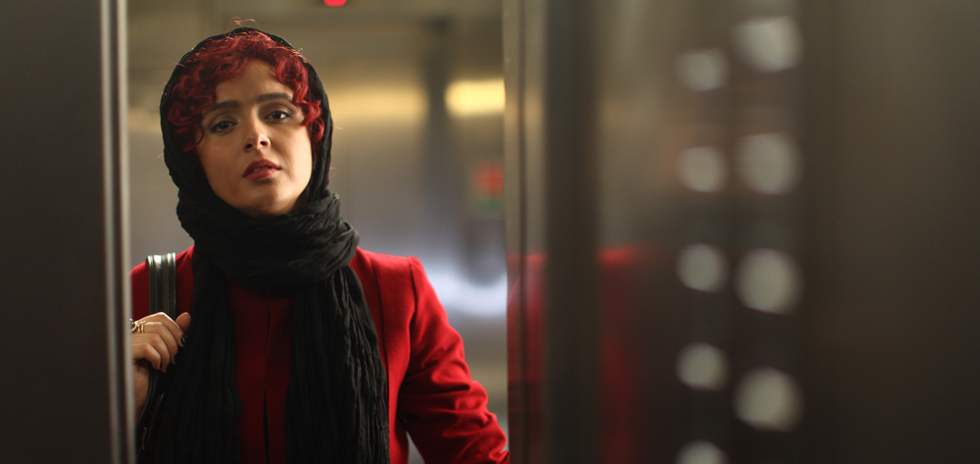
Much of Ali Ahmadzadeh’s Madare ghalb atomi1 works as an Iranian take on Jarmuschian ideas of age, culture and place — set for the most part in a car, with pop culture literate dialogue, at one point a neat one-take, and featuring an impressive use of music — though this intriguing style is undercut by an eventual genre shift in the film, from comic drama to thriller. The shift isn’t exactly sudden, but the way in which characters develop in the final third renders it a wholly disappointing conclusion to what was shaping up to be a compelling piece of social commentary from independent Iranian cinema.
Atom Heart Mother, named after a character’s dream scored by the Pink Floyd song of the same name, follows a night in the lives of two young women in Tehran, Arineh (Taraneh Alidoosti) and Nobahar (Pegah Ahangarani). They’re attempting to drive home from a party, albeit under the influence of alcohol, and on the drive they meet three men, each of whom seems to represent a facet of Iranian society. First, they find Kami, their perpetually sunglasses-clad friend, who waxes lyrical on the origins of the ‘Western toilet’ and the frustration at seeing Iranian “nobodies” succeed internationally rather than work at home. The second man is a policeman, who believes in the strong religious values of an Islamic state and wishes to know what’s wrong with Ben Affleck’s Argo so he too can criticise it. The third man, Toofan, is a mysterious figure who looks cut from the same cloth as George Clooney, appearing out of nowhere and attempting to lure the women into a parallel conception of Tehran. The event that sees these three men intersect with the women is a car crash, a squabble over money leads them to owe Toofan a debt, which he makes them repay not just with cash but time.
For the first half of Atom Heart Mother, Ahmadzadeh crafts an amusing and intimate film about friendship between two women in Iran, as they fondly remember childrens’ television show themes and think about their futures (moving away from Tehran is important here). Both Alidoosti and Ahangarani are both impressive presences on-screen, their dialogue funny and their relationship becoming gradually complex. They live together, seem devoted to one another, and reject all romantic advances from male characters throughout. The arrival of Toofan, though, is where their complex relationship quickly unravels. He acts as a figure of male aggression and power, his eventual physical mistreatment of the women doesn’t seem to stop them from following him either, and a question near the film’s end as to whether Nobahar will leave Arineh for a mysterious future is handled so poorly that it makes you wonder whether the script really did have a complex friendship in it, or if the two actresses did all of the heavy lifting.
A sequence that encapsulates much of the promise of Atom Heart Mother is a delightful extended sing-along of “We Are The World”. Arineh, Nobahar and Kami sing it in their car, alternating verses and choruses, a collective celebration coming mere moments after a discussion about American aggression in the Middle East. What the song does, then, is ground many of the film’s ideas in its characters, rather than having broad swipes at political speech. The focus is on the individual is paramount. Even after the arrival of Toofan, though, there’s still a comedic sensibility. The appearance of a public figure thought to be dead seems to set the film up for an unhinged yet compelling finale, though so much of the promise of the idea of dictators and villains faking their deaths dissipates once Toofan reveals where he is from and his aims.
As the film moves towards its end so much of the goodwill the film accrues in its engaging tone and characters falls by the wayside as a result of a contrived series of emotional stakes, the gradual move from near-absurd cultural commentary to an intentionally beguiling thriller. In his director’s statement, Ahmadzadeh said that one of the big creative ideas behind the film is that “should, one evening, a dictator cross your path, you will rapidly realise that he lives on a completely different planet to you.” This seems to lack the self-aware absurdity that could have been reaped from the appearance of a certain dictator, instead it plays it in a fairly mundane fashion, a monologue about a fantasy world in place of any visual proof.
Though there’s much promise in Ahmadzadeh’s second feature, it ultimately ends unsure of exactly what it wanted to be. Whilst it could have become a refreshing look at youth culture in Iran and the promise of the future, it ends as a limp projection of a perceived alternate world, complete with some overwrought thematic undertones about war and death.
